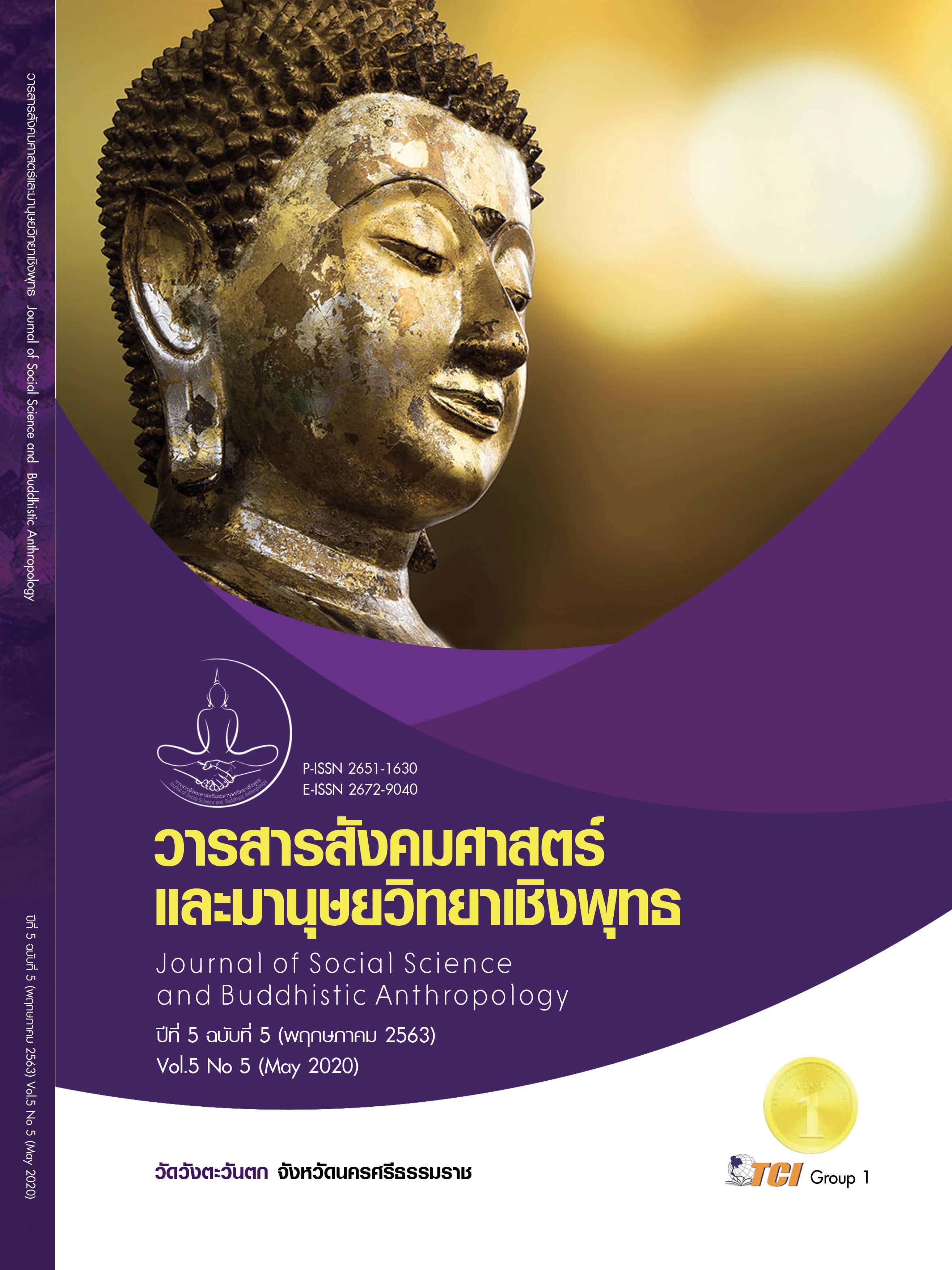ANTECEDENTS AFFECTING GOOD ORGANIZATIONAL CITIZENSHIP BEHAVIOR AND EMPLOYEE PERFORMANCE EFFICIENCY IN AUTOMOTIVEPARTS INDUSTRIES
Keywords:
Antecedents Affecting, Good Organizational Citizenship Behavior, Employee Performance Efficiency, Automotive Parts IndustriesAbstract
The main objective of this study was to antecedents affecting good organizational citizenship behavior and employee performance efficiency in automotive parts industries. And to study the indirect effect of the mediating variable by good organizational citizenship behavior. The population of the study was operational staff in various automotive parts industries in Rayong and Chonburi provinces amount 11,035. The sample size was determined by the known formula of the population size of Taro Yamane, there are a total of 314 samples. This study used probability sampling with stratified sampling and nonprobability sampling with purposive sampling. The study instrument was a set of questionnaires and analyzed data using descriptive statistics including frequency, percentage, mean and standard deviation and inferential statistics by structural equation modeling. An a result of the data analysis, it was found that there was consistency between the structural equation model and the empirical data; the derived values were; Chi-square = 222.698, p-value = 0.000, Chi-square/df = 1.754, GFI = 0.934, AGFI = 0.902, NFI = 0.906, CFI = 0.956 and RMSEA= 0.049. The hypothesis testing confirmed the fact that vertical leadership, interpersonal relationship, organizational climate and perceived organizational support had direct effect on employee performance efficiency in automotive parts industries. The relationship had a statistical significance of 0.05, and the prediction power was found to be 97 percent, whereas the indirect effect on the employee performance efficiency of the organizational citizenship behavior was found to have statistical significance at the .05 level and the predictive power was 52 percent.
References
กมล อนานนท์ และคณะ. (2562). ปัจจัยเชิงสาเหตุที่ส่งผลต่อประสิทธิผลการปฏิบัติงานของบุคลากรการไฟฟ้าส่วนภูมิภาคในพื้นที่ 5 จังหวัด ภาคตะวันออกของประเทศไทย. วารสารวิชาการ มหาวิทยาลัยกรุงเทพธนบุรี, 8(2), 157-168.
กัลยา วานิชย์บัญชา และฐิตา วานิชย์บัญชา. (2558). การใช้ SPSS for Windows ในการวิเคราะห์ข้อมูล. (พิมพ์ครั้งที่ 27), กรุงเทพมหานคร: โรงพิมพ์สามลดา.
ชาติชาย คงเพ็ชรดิษฐ์ และธีระวัฒน์ จันทึก. (2559). การบริหารการเปลี่ยนแปลง: บทบาทของภาวะผู้นำและการสื่อสารในองค์การ. Veridian E-Journal, 9(1), 895-919.
ฐิติวัจน์ ทองแก้ว และวิโรจน์ เจษฎาลักษณ์. (2560). การรับรู้ถึงการได้รับการสนับสนุนจากองค์กร พฤติกรรมการเป็นสมาชิกที่ดีขององค์กร และผลการปฏิบัติงานด้านวิชาการของบุคลากรสายวิชาการในสังกัดมหาวิทยาลัยราชภัฏ กลุ่มรัตนโกสินทร์. วารสารอิเล็กทรอนิกส์การเรียนรู้ทางไกลเชิงนวัตกรรม, 7(1), 68-81.
ธนาคารออมสิน. (2562). อุตสาหกรรมยานยนต์. เรียกใช้เมื่อ 11 ธันวาคม 2562 จาก https://www.gsb.or.th/ getattachment07c2aa6e-9bc2-4682-8a9e-90b057178223/motor_61_62.aspx
ธิติ ธิติเสรี. (2557). อิทธิพลความกล้าหาญของพนักงานและบรรยากาศองค์กรที่มีผลต่อประสิทธิภาพการปฏิบัติงานของพนักงานการไฟฟ้าส่วนภูมิภาค. ใน สารนิพนธ์บริหารธุรกิจมหาบัณฑิต สาขาการจัดการทั่วไป. มหาวิทยาลัยเทคโนโลยีราชมงคลธัญบุรี.
นิศาชล รัตนมณี และประสพชัย พสุนนท์. (2562). อัตราการตอบกลับของแบบสอบถามในงานวิจัยเชิงปริมาณ. วารสารมนุษยศาสตร์และสังคมศาสตร์ มหาวิทยาลัยธนบุรี, 13(3), 181-188.
เบญจวรรณ ศฤงคาร และคณะ. (2561). บรรยากาศองค์กรและคุณภาพชีวิตการทำงานที่มีผลต่อประสิทธิภาพการทำงานของพนักงาน. วารสารสหวิทยาการวิจัย: ฉบับบัณฑิตศึกษา, 7(1), 35-44.
มณฑิรา อินจ่าย และเฉลิมชัย ปัญญาดี. (2556). ภาวะผู้ตามในผู้นำ: พหุกรณีศึกษาจากผู้บริหารสมรรถนะสูงขององค์การธุรกิจไทย. วารสารมหาวิทยาลัยนเรศวร, 2013(Special Issue), 47-58.
มะลิวรรณ อรรคเศรษฐัง และสายตา บุญโฉม. (2559). บรรยากาศองค์การที่ส่งผลต่อประสิทธิภาพในการปฏิบัติงานของบุคลากร สำนักงานสรรพากรพื้นที่กาฬสินธุ์. ใน เอกสารการประชุมวิชาการและเสนอผลงานวิจัยระดับชาติ ครั้งที่ 3 (น.531-537) นครราชสีมา. วิทยาลัยนครราชสีมา.
วรรณา ยงพิศาลภพ. (2561). แนวโน้มธุรกิจ/อุตสาหกรรม ปี 2561-63 อุตสาหกรรมชิ้นส่วนยานยนต์. กรุงเทพมหานคร: ธนาคารกรุงศรี.
ศูนย์วิจัยกสิกรไทย. (2560). SME ไทยก้าวทันกระแสยานยนต์ยุค 4.0 แล้วหรือยัง. เรียกใช้เมื่อ 11 ธันวาคม 2562 จาก https://kasikornbank.com/th/business/sme /KSMEKnowledge/article/KSMEAnalysis/Pages/Thai-Automotive_4-0.aspx
สุชน ทิพย์ทิพากร และประสพชัย พสุนนท์. (2560). ความสัมพันธ์ระหว่างคุณภาพชีวิตในการทำงานกับความผูกพันต่อองค์การของพนักงาน กรณีศึกษา: สถานประกอบการในจังหวัดนครปฐม. วารสารธุรกิจปริทัศน์, 9(1), 143-158.
อรฤดี ธิติเสรี. (2559). อิทธิพลของพฤติกรรมการที่ดีของสมาชิกในองค์กรและความผูกพันต่อองค์กรที่มีผลต่อประสิทธิภาพการปฏิบัติงานของพนักงานการไฟฟ้าส่วนภูมิภาค สำนักงานใหญ่. ใน สารนิพนธ์บริหารธุรกิจมหาบัณฑิต สาขาการจัดการทั่วไป. มหาวิทยาลัยเทคโนโลยีราชมงคลธัญบุรี.
อุตสาหกรรมยานยนต์ไทย. (2555). สำมะโนธุรกิจอุตสาหกรรม พ.ศ.2555. กรุงเทพมหานคร: อุตสาหกรรมการผลิต ทั่วราชอาณาจักร.
Burke, C.S. et al. (2003). The role of shared cognition in enabling shared leadership and team adaptability; in: C. L.Pearce& J. A. Conger, editors, Shared Leadership: Reframing the Hows and Whys of Leadership. (p 103). CA:Sage: Thousand Oaks.
Danish, R.Q. et al. (2015). Relationship between perceived organizational support and organizational citizenship behavior; a study of employees in National Highway Authority of Pakistan. American Journal of Economics Finance and Management, 1(3), 195-199.
Ensley, M.D. et al. (2006). The importance of vertical and shared leadership within new venture top management teams: Implications for the performance of startups. The Leadership Quarterly, 17(3), 217-231.
Hair, J.F. et al. (2010). Multivariate data analysis (7th ed.). NJ: Prentice Hall.
Hom, P. & Griffeth, R. (1995). Employee turnover. Cincinnati. OH: South-Western.
Muchinsky, P. M. (2006). Psychology applied to work: An introduction to industrial and organizational psychology (8th ed.). Belmont CA: Thomson/Wadsworth.
Organ, D. W. (1987). The Applied Psychology of Work Behavior: The Good SoldierSyndrome. Massachusetts: Lexinton.
Organ, D. W. (1997). Organizational citizenship behavior: It’s construct clean-up time. Human performance, 10(2): 85-97.
Yamane, T. (1973). Statistics: An introduction analysis (3rd ed.). New York: Harper and Row Publication.
Zikmund, W. G. et al. (2010). Business research methods (8th ed.). Australia: South Western Cangage Learning.









